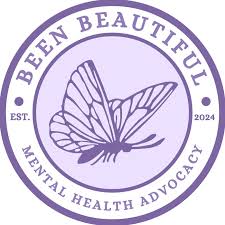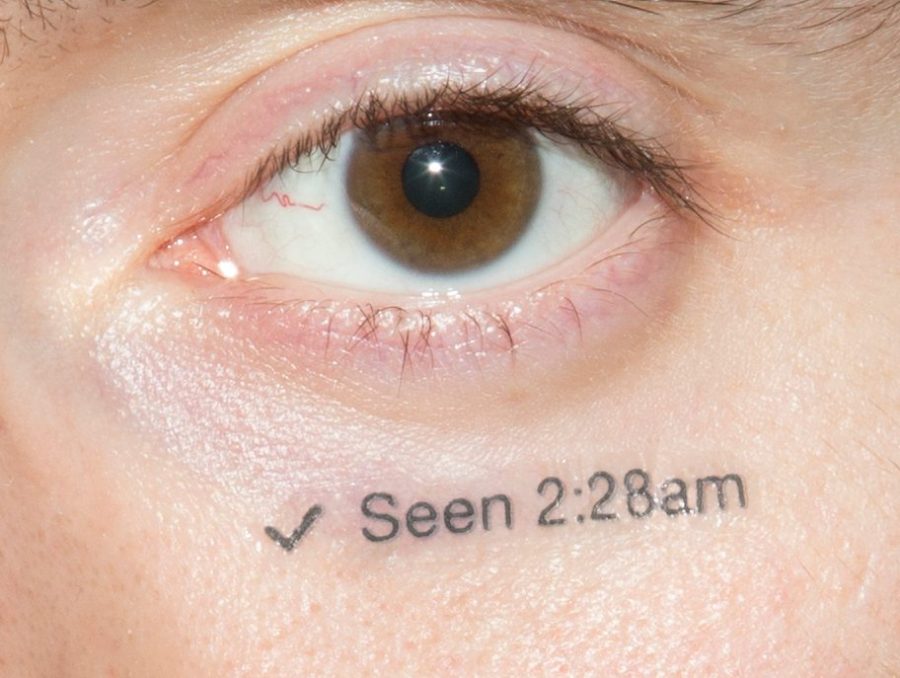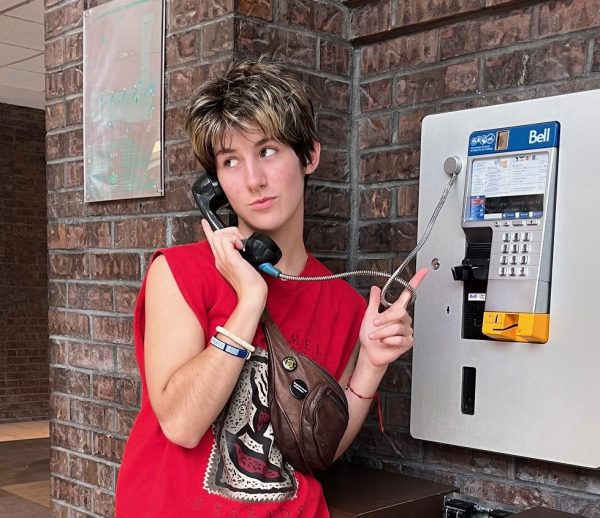Chronically Online: How the Cellphone Became a “Weapon”
December 16, 2022
Social media has, on its own, left the most helpful and yet harmful impact on our modern youth. Across generations, it seems the most polarizing tool invented, and yet, we can’t stop using it.
Social media is built to be addictive. The fast-paced environment coupled with numerical validation like followers and like counts train us to constantly seek more. Connecting with others has become replaced with a drug-like stream of endless content—when we see that positive feedback on our content, we desperately want to keep going back.
The online world has become completely unavoidable. In our modern infrastructure, it is nearly impossible to live without being influenced by what you see online or what is spreading around online. The internet seeps into reality until they are indistinguishable. It is critical to ask, in a space like a high school, where judgement is most powerful, what effects are social media having on young people?
To investigate, a survey of about 50 anonymous students was conducted on this topic. The results were not only enlightening, but unanimous. First, the survey investigated just what students see online and how often they see it.
Most students (up to 70%) use social platforms like Snapchat, Instagram, and most prevalently, TikTok. When asked on a scale of 1 to 10 how often they use these platforms, a majority of 23% responded with a 7. 20% responded with a 10. These results tell us that DHS students are constantly taking in information from social media and the internet—and taking that information with them into the real world. On average, students trust this information about 3 out of 5 times, based on the survey. However, the vast majority of students agree that people are much kinder to each other in real life than on social media.
This is because social media and the protection of online aliases make a person feel freer from consequence online than in person. In the words of one student response, “When you hide behind a screen, you can do anything.” On the internet, you can curate your persona carefully until you are presenting a completely different personality than your real self. Coupled with the rate information spreads online, this makes for the perfect recipe for rumors to spread. In fact, on average, students answered that they see people posting “gossip” or “drama” at a 3.5/5 frequency.
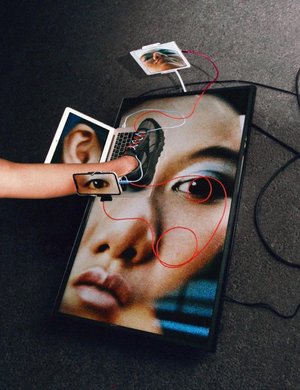
The second half of the survey focused on the effects of social media on students’ perception of themselves and others. A clear consensus came through the results, especially to the question, “How does social media impact how you view yourself?”
Most students replied that social media had a distinctly negative impact on their self-image and self-perception, especially surrounding physical appearance. One student writes, “Social media brings out a ton of insecurities. I know there are many ‘standards’ in terms of appearance and mental behavior.” Even online, we cannot manage to find an escape from societal expectations and limits. Another simply writes, “There are prettier women than me.”
Further, social media seems to twist our realities. A student claims that social media “makes people view themselves way different than what everyone else may see,” and we might start to lose ourselves under the peephole lens of the internet. Another says, “Social media controls us more than we think.” We have come to believe that people post their entire lives online, but we fail to see how curated and cherry-picked every single post is. By tricking ourselves into thinking every online profile is honest, we lose touch with reality, as well as the humanity of those around us. We compare ourselves to these faux perfectionist vessels, and we start to believe we are the ones that are not normal. Even this student, who does not use social media, writes that “some people may compare themselves to people they see online which can create lots of issues to your self esteem.”
On the greener side of the grass, a portion of students responded describing how social media can be a strong motivator in their lives. Responses mentioned that seeing certain people online doing well for themselves makes users want to make that positive change for themselves. “The posts I see are mainly positive about all body types,” says one responder, highlighting how your experience can be drastically different depending on what side of social media you call home. Movements like body positivity have seeped into online spaces, and in some cases, the internet can “make us feel better about ourselves.”
Social media can also connect us to others from anywhere in the world: “It lets me reach out to people online who I may not get the chance to from where I live.” It is an instant way to help others who might have no one to lean on in their offline home. Not only does this make us feel good for helping others, but sometimes we are the ones in need of help, and the internet is the only place we can find that solace. Eliot Alonzo, a senior at DHS, eloquently explains that “for every toxic environment [social media] creates, it also builds a community of people willing to back each other.”
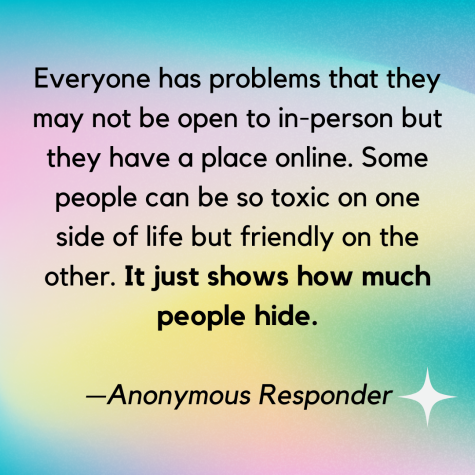
What about how we view others? Especially in high school, a majority of posts we come across have to do with other people’s affairs. This could be celebrities, friends, or whoever is on the chopping block at school: “Social media could impact how you view others by seeing the drama about someone and immediately trust the source.” We have a suffocating tendency to define each other by what is posted online. With this, we might feel pressured to talk about or not talk about certain topics. For instance, in the summer of 2020, the Black Lives Matter movement suddenly became visible and important to those who were unaware of it previously. There came an unspoken pressure to speak on racial issues to a point where white people were invading spaces specifically created to be safe and exclusive to people of color, believing that their online activism was sparking the discussions that people of color have been having for decades.
Later, in 2021 and after Derek Chauvin’s verdict was declared, the movement once again became nonexistent to those that it didn’t directly impact. Everyone changed their profile pictures back and removed #BLM from their profiles, and the world continued to turn. Hardly any of the performative activism we saw from white people online became real-world impact. The only reason some people claimed to care in the first place is they were afraid of being outcasted or accused of anything.
Many students simply replied that social media makes them see others negatively. One answer declares “the essence of [social media] is that it’s an echo chamber. […] That’s how it works.” This can be both validating and isolating—if we are never interacting with different people or opinions, how can we escape the trap?
Sophomore Christopher Borges summarizes it perfectly: “[Social media] creates an illusion of [reality] which can misinform and sadden us. However, unlike our parents when they were in high school, we are much more connected with the world and current events which allows us to be better citizens and high school students.” He assures that it cannot change who he is, and it is an essential tool for accessing new information and ideas. Alonzo concurs: “There is no point in changing yourself based on others anyway, but it is done unconsciously.” They note that the constant exposure to other worldviews influences both big ideas like core beliefs and smaller ideas like style or vocabulary. However, Alonzo also knows that online, we might hyper-focus only on what is presented to us, and lose sight of the rest of the world.
It’s a paradox. But it didn’t always exist.
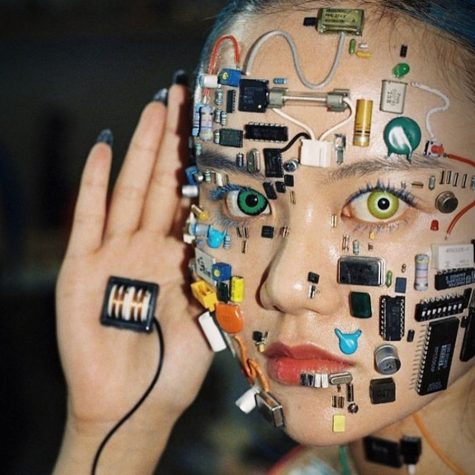
For the final portion of this study, an interview was conducted with Mr. Justin Hitchcock, as a means of exploring older generations’ view of the internet—particularly older generations that spend their entire days educating teenagers.
Hitchcock teaches several different English classes, and in his time teaching, he notices that students feel a need to bring social media into real life. “There is a tendency […] to catch many moments in their lives to hold them in a digital space,” he claims. Compared to his experience in high school—when the internet as a form of communication was newly emerging—real life and the internet were completely separate. “We thought of these things as a joke,” he reports. Online profiles were “a symbolic part of you,” and were not meant to represent your whole life. In many cases, the only online presence young people had was to promote their own creations, like music.
However, today we find ourselves “frustrated” with Instagram pages that focus on a specific part of or joke at DHS. Social media is not just a part of our present lives—it has the power to control us, and we can’t tell the two apart anymore. Hitchcock says that the cellphone has become a “weapon,” as people are now worried that an out-of-context moment might appear online and have real-world consequences. “You can’t act out of what is perceived as the norm because you’re worried about where it might go,” he states. “You’re afraid of what they might do.”
From a teacher’s perspective, the wrath of these DHS-centric pages is dying down. Hitchcock still believes that social media is an immensely useful tool, and he would like to use it more in his classroom. Social media is used for an “extension activity” to “combat pages like [DHS accounts on Instagram]” that might be “outputting all this negative energy on the internet” and giving the school a bad online image. He regularly encourages his clubs to have a positive online presence and his students to share positive aspects of what they’re learning. Unfortunately, though, we can never assume that everyone has the same access to online materials, which bars social media from being a regular tool in class.
We know that social media is near impossible to regulate. In this day and age, it is a survival tactic to remind ourselves of the big wide world that exists outside of the internet. We cannot forget that we are entire people, not just pixels on screens. As soon as we forget how to live without the internet, we also lose our humanity, and even control over ourselves. The internet does not have to be anyone’s personal hell—it can be used in moderation—for now, though, it is time to face the world.








